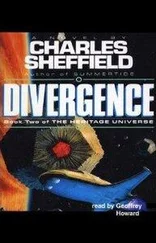“It’s not a commercial airport.” Reza giggled. “Not a military base, either. Not a highway. And not very big. But it’s all we’ve got. Hold tight. I’ll have to use the engines full throttle and bank at the same time to drop us in there.”
Celine slid back down the hammock, to settle between Wilmer and Jenny. You dreamed for a whole year of the triumphant return to Earth. Although you never discussed it or admitted that you ever had such thoughts, you rehearsed mentally the words to be spoken as you emerged from the lander. Those dreams and words did not cover the case where you swooped to a blighted Earth across a snow-covered landscape, in a crippled and jury-rigged orbiter.
“We’re very close,” Reza said happily. “Ten seconds to touchdown. But we’re moving too fast, and the strip we’re landing on is shorter than I thought. Even with maximum retro-thrust we’re going to overshoot the far end. Be prepared for something rough.”
After that warning, the first contact of the orbiter with the ground seemed soft as a kiss. Celine heard the hiss of landing wheels and felt a tremor as they raced along the surface. The retro-thrusters howled, and once more she was pushed deep into the hammock.
“This is it,” Reza said, and the orbiter shuddered and reared up onto its head. Celine felt one crushing moment of force. Then she was lying on her back, staring up at the cabin’s rear wall. Wilmer was lying half on top of her, muttering and wriggling.
“Reza?” she asked.
“I’ll live. I said you could trust me. How is it back there?”
“All right,” Jenny said, and Wilmer added, “Me, too, but the side wall has bent in. I can’t move until Celine does.”
“Don’t try.” From the sounds, Reza was releasing himself from his harness. “Sit tight and I’ll try to open the hatch. It’s going to be tricky. We’re in the middle of a snowdrift.”
Sitting tight was easy. Unable to move, Celine could do nothing but wait and listen to Reza’s gasps and grunts of effort.
“Good thing it slides,” he said after half a minute. “We’d never have opened it outward against packed snow. And the drift is almost to the top of the door. Another half meter and we’d have to tunnel free. But I can get to you now.”
He kicked at the banked snow, enlarging the hole, and used the space he had made to crawl upward and free the hammock clamps on one side. Celine, Jenny, and Wilmer rolled together to finish in a heap near Reza’s feet.
“Anyone have some first words for our return to Earth?” he said. “The ones I’d been working on don’t seem to apply anymore.”
“We made it,” Jenny said shakily. “In that last few minutes, I felt sure we wouldn’t.” She reached out and put her arms around his neck. “I’ve always laughed at you when you told me what a great pilot you were. But you are.”
“You’d better believe it.” Reza went on kicking at the snow, making a hole big enough to crawl through to the ground outside. “Celine, you first. You’re the head of the Mars expedition now.”
His words brought back to Celine the memory of the crew members who were not with them. The sheer exhilaration of being alive faded. She eased her way feet-first into the hole that Reza had made, and the mound of snow crumbled and sank beneath her weight as she slid to the ground.
She stood up, waited for the other three to join her, then said, “We, the surviving members of the first human expedition to Mars, honor the memory of Ludwig Holter, Alta McIntosh-Mohammad, and Zoe Nash. Without the lessons learned from their sacrifice, our own return to Earth would have been impossible.”
Jenny gasped, and all four bowed their heads. They stood shaky-legged and silent for half a minute in the long-awaited air and gravity of Earth. At last Celine looked up and made her first inspection of their surroundings.
She stood at the end of a long stretch of tarmac about fifteen meters wide and three hundred meters long. By her side the orbiter was nose-down and buried deep in a bank of snow that had damped the force of its collision. The ship was ruined and might never fly again, but crazy Reza could take pride in his piloting. Even orbiter specialists expected a runway twice as long and wide as this one.
Beyond the runway, hugging the ground and partly dug into it, Celine counted half a dozen wooden buildings. Gray smoke rose from the chimneys of three of them, and the snow had melted from their roofs. Around the runway, trees clad in the foliage of late spring stood bowed down by snow. More deep snow covered the bushes and ground between them. In the distance, white hills stretched to the horizon. The orbiter had landed in the deepest part of a valley. The air that filled Celine’s nostrils was rich with strange but familiar smells, of smoke and pine needles and resin. She stretched her arms wide, luxuriating in wide spaces and open sky. The air was colder than she had expected.
“And you told me,” Jenny said, “that the temperature on Earth is higher because of supernova heating?” It was less a question than a skeptical jibe intended for Reza, but Wilmer answered.
“Globally, and overall. But the effects you’re most likely to notice are the fluctuations from normal weather. Like now. Much more chilly than usual for this time of year. Somewhere else, maybe down at the South Pole, it’s one big heat wave.”
“Then take me to the South Pole,” said Jenny. Her teeth were starting to chatter. Celine suspected most of that was nervous reaction. On the other hand, Jenny was thin and lightly built, and she had removed her jacket on entering the Clark to provide a little more padding to the hammock.
“We have to get inside,” Celine said. She gestured toward the buildings. “Inside there. They must have heat.”
“And a place to rest.” Jenny took a trial step, then another. “If we can walk that far. Ooh, Earth gravity. My legs feel like spaghetti.”
Reza took her arm to help her. “Come on. Walk. We have to.”
“Maybe not.” Wilmer pointed along the valley, to a building shaped like an A-frame barn. The front had opened to reveal three odd-looking machines. They were painted dark red and had balloon tires, and a handful of people stood clustered around each one.
“We don’t need to walk,” Celine said. “They’ve noticed our arrival. We can relax. Thank God, we made it. We’re home from Mars.”
Saul was explaining to Yasmin the history of his relationship with Tricia. The facts were easy, though he didn’t quite understand why he was offering them; and Yasmin did not ask.
Did not ask that question, at least; she asked a hundred others. Did Tricia know of his political aspirations when they first met? Had he been in a relationship of his own at the time? How old was Tricia? Was he upset by her multiple marriages and divorces? Did he know her previous husbands personally? Her present husband? Did he know her family? Had she met his mother and his sister? Did she know how much he was worth? Did she, in fact, even realize that he was rich?
As soon as they finished eating they moved into the next room, a small lounge with two old armchairs in front of a fireplace and a fake log fire. The room was heated by hot-water radiators that creaked and cracked as they expanded and contracted, so that Saul constantly glanced into the corners to see what else was going on in the room. He had come to the story of that final evening, when he had told Tricia that all thoughts of marriage must be postponed until after the election. At a critical moment, just as he was trying to recall his own exact words, the overhead lights flickered and dimmed to an orange glow.
He looked at Yasmin questioningly and she shook her head. “Nothing to do with me. It’s midnight, and they’ve gone to low power to conserve energy. I suspect someone is trying to tell us it’s bedtime. Go on.”
Читать дальше












